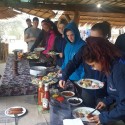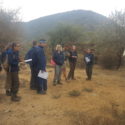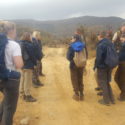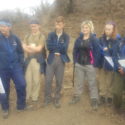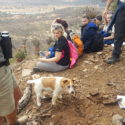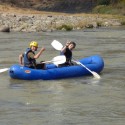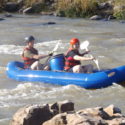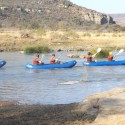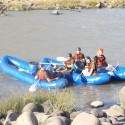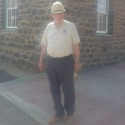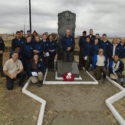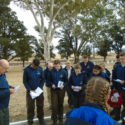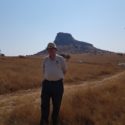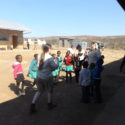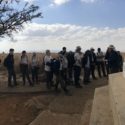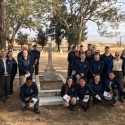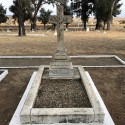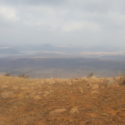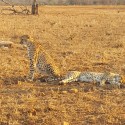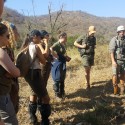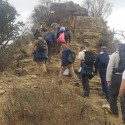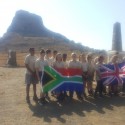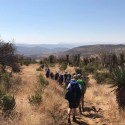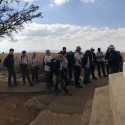“This trip is a life changing event and I am not the only one who has said that.”
Cadet Aaron Burke.
Whilst everyone in Middlesex and North West London ACF were being picked up by coaches to go to Annual Camp at Sennybridge in South Wales a group of 18 cadets plus 6 adults had been collected and were on the way to Gatwick for the long flight to Johannesburg in South Africa via Istanbul.
Exercise Roberts Drive 17 was designed to be both physically and mentally challenging for all those who volunteered to take part and with a packed programme – in fact the only downtime was travelling there and back – everyone became adapt to sleeping in the minibuses. In addition to the long journey to South Africa via Istanbul we also had to make sure that the paperwork required by the South African authorities was 100% correct otherwise cadets would be denied boarding in the UK, Istanbul and even entry once we had arrived. Fortunately all the weeks of effort expended on getting it right paid off and with one minor exception we sailed through. Of course getting in was only half the battle – we had to get back out as well!
The programme itself had a number of activities all of which were designed to stretch both cadets and adults physically and challenge them mentally. These ranged from undertaking a 2 day trek along the Zulu trail preceded by a two days of paddling down the River Tugela including sleeping out in the bush on a beach.
“At the beginning I feared the water and cold, but I completed the canoeing and even chose to go further down the Tugela River. I was very proud of myself for overcoming my fears and thankful to the members who helped me to do so.”
Cadet Sami Lerari.
There were Zulu and Boer war battlefield studies including visiting Isandlwana and Rorke’s Drift and the fields of Colenso and Spion Kop. There was remembrance as we visited the grave of Captain Freddie Roberts VC after whom this exercise was named (and the recipient of the first VC to be awarded posthumously) and reflection on top of Spion Kop. There were game conservation/bush survival walks and talks as well as both mounted and dismounted game drives – the latter being with armed guides. And finally our camps were ‘open’ so that wild game could and in fact did walk through at various times including Cheetah, warthogs and, Nyala – a deer like creature. The hippos were a scant 100m away in the river and often moved around at night along tracks by the camp where the cadets and adults stood an uneasy night watch each night – with appropriate back up in case the animals got to close!
“The most challenging part of this trip has to be the Zulu trail/hike. At first I thought I wouldn’t be able to complete the walk and on the second day I faced challenges which I thought would make it impossible for me to complete but thanks to the staff and Angus who helped me through I was able to complete the walk which gives you an incredible feeling once you reach the end.”
“I enjoyed the Zulu Trail. It was hard terrain to walk across and we had to rely on motivating each other to keep on going, however we all worked together to get there. I found the second day much harder as I was tired from the previous day, but at the hardest point right near the end one of the guides gave us encouragement (and Capri suns !!) so we made it to Elandsheim.”
“We experienced some amazing things like visiting all of the war memorials and the battle sites. The Zulu and Boer war were both something I knew very little about before coming on this trip, but the tour guides were great and I learnt a lot and it was great to see both sides of the story. My favourite site was when we saw the Zulu memorial (Isandlwana) and leaning the symbolism behind the memorial and what it stood for.”
Early on in the programme we undertook a community engagement visit to a local Zulu school where most of the pupils were orphans. Although approached with some trepidation (and that’s not just because of the 8km uphill walk required to get there and back) it had the most profound effect as the following comments show:
“It would be difficult to say what the highlight of my trip was as every day was so different, but the school was definitely one of the best experiences. We walked around 8kms there and then 8kms back, and even though it wasn’t an easy walk I’d have happily done it all over again to visit them another day. The children were all so friendly, and despite them living with less than bare minimum they all seemed so happy. Some of the older girls spoke a little bit of English, and one of them told me that she wants to be a pilot when she’s older. I think the day at the school opened up a lot of people’s eyes.”
Cadet Bethany Rosier-Kenley“On the way to the school I was dreading meeting the children as I didn’t know what to expect and thought it would be awkward however it was exactly the opposite. This was an amazing experience that I will treasure for the rest of my life, to not only see such joy on the children’s faces, but also to experience a part of their life and it was a shock to me to see the contrast in our lives. It put into perspective just how much I take for granted.”
Cadet Bethany Porter“Walking up to the school we realised just how easy we have it back at home and was a real eye opening experience for us although it did hit some more than others. Playing netball, football and interacting with the children allowed us to realise how important it was to be happy no matter the situation you are in which has made me realise that we complain too much back home.”
Cadet Odeta Galminaite
The exercise has had a different impact on all those who took part and the most immediate and obvious ones that were apparent by the end were better teamwork and a determination to succeed in all the activities. The visit has made individuals question their career paths as they currently are and has opened up new possibilities. The visit to the school made the cadets question their own world and a society which is mainly defined by possessions such as the latest must have telephone, IT gadget or clothing and instant access to everything. This will hopefully make cadets in the future more appreciative of what they have got and have access to.
There will be another ROBERTS DRIVE and it is likely to be different in content and the order in which the activities take place. There is unfinished business at the school in helping them to move into the 21st century and perhaps realise some of their pupil’s aspirations and the cadets want to help with that.
In the meantime on behalf of all the participants may I thank the Ulysses Trust for its most generous grant donation which enabled the cadets and adults to take part in such a challenging exercise. Without your help the cadets would not have managed to achieve so much or indeed the children at the Zulu school.
Tim Rayson
Captain (retd)
Exercise Leader

